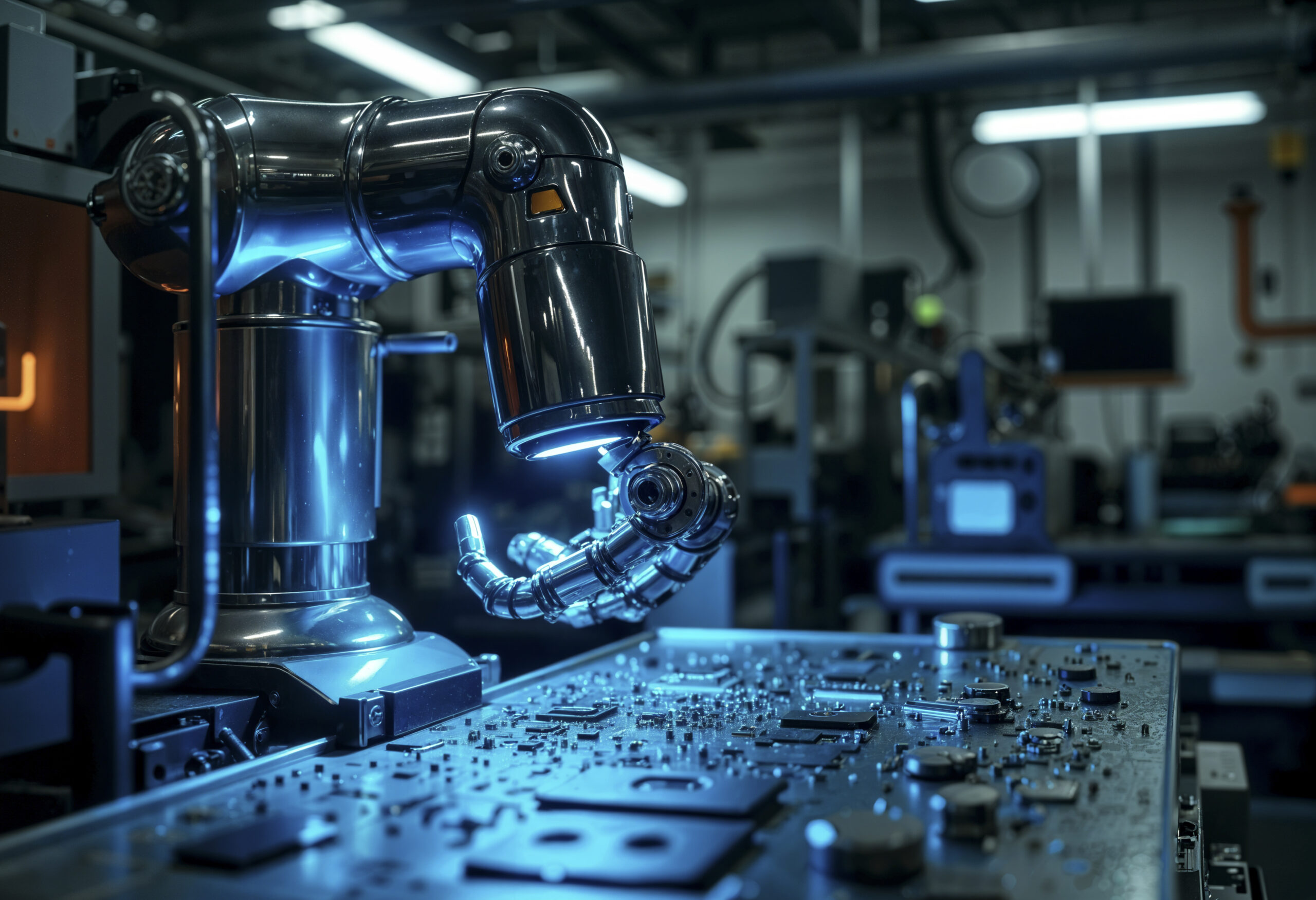Every minute of downtime in manufacturing bleeds money. Machines that stop mean lost revenue, missed deadlines, and frustrated clients. The reality? Traditional operations struggle with inefficiencies—rising labor costs, supply chain disruptions, and unpredictable equipment failures.
But leading manufacturers aren’t waiting for problems to happen. They’re using AI to predict failures before they occur, optimise supply chains in real time, and automate quality control—slashing costs and maximizing efficiency.
The question is: Will you adapt now, or watch your competitors pull ahead?
In this article, we break down how AI consulting transforms manufacturing operations, delivering measurable cost savings and operational advantages.
The future of smart manufacturing is unfolding today. Let’s explore how AI consulting can transform your operations and secure your competitive edge in the global market.
Challenges in Manufacturing Operations and How AI Can Solve Them
Every stalled machine. Every supply chain delay. Every quality defect. They all cost you money.
- Rising labor costs and wasted materials eat into your margins.
- Production slowdowns and supply chain delays cause costly disruptions.
- Limited data insights make it hard to optimise operations.
And yet, some manufacturers are thriving. The difference? AI consulting.
AI in Action: Real-World Manufacturing Success Stories
In the competitive world of manufacturing, every second counts. AI consulting offers powerful tools to tackle your most persistent operational challenges, driving efficiency and reducing costs across the board. Let’s dive deeper into how AI can transform your operations.
1. Predictive Maintenance: Minimise Downtime Before It Happens
Unforeseen machinery breakdowns can cause major disruptions, costing thousands of dollars in unplanned downtime. Equipment failure is a hidden drain on productivity that often goes unnoticed until it’s too late.
AI predictive maintenance uses advanced algorithms to analyse sensor data from machines and equipment. This allows AI to predict when a piece of machinery is likely to fail, giving you the power to address the issue before it disrupts production. By anticipating malfunctions, manufacturers can schedule timely maintenance during non-peak hours, avoiding costly emergency repairs and downtime.
- AI systems can forecast machinery malfunctions with up to 95% accuracy
- Manufacturers experience a reduction in unplanned outages, which saves an average of 12–18% in operational costs
- Businesses can extend the lifespan of expensive equipment, saving on costly replacements and repairs.
General Electric (GE), a leader in industrial manufacturing, has implemented AI-powered predictive maintenance across its power generation plants. By using AI to monitor machinery performance, GE has reduced unplanned downtime by 20% and saved millions in repair costs. GE also reported a 10% reduction in maintenance costs through AI-driven predictive analytics.
2. Supply Chain Optimisation: Cut Waste, Reduce Overstock, and Improve Efficiency
Rising labor costs, supply chain delays, and inefficient inventory management result in excess stock or stockouts, increasing operating costs. With ever-changing demand patterns, manufacturers struggle to make accurate forecasts and optimise their supply chains in real-time.
AI solutions analyse large amounts of data to predict demand patterns, optimise inventory levels, and streamline the supply chain process. AI-powered tools use historical sales data, market trends, and real-time inputs to forecast demand with incredible accuracy. This helps manufacturers avoid overstocking, reduce inventory costs, and minimise waste.
- AI helps optimise inventory, cutting inventory holding costs by 20–25%
- AI can reduce supply chain inefficiencies and delays, enabling faster response times and reduced lead times.
- Companies that implement AI-driven supply chain systems often see a 25% reduction in operational costs
Unilever, one of the world’s largest consumer goods companies, implemented AI-driven supply chain optimisation to better predict demand and improve inventory management. By analysing global demand patterns with AI, Unilever reduced its inventory holding costs by 22% and improved its order fulfillment rate by 15%. This led to a significant reduction in both logistics and operational costs.
3. Quality Control Automation: Detect Defects Faster and More Accurately
Manual quality control inspections are time-consuming, prone to human error, and often slow down production. Ensuring the quality of every product without slowing down the assembly line can be a major headache.
AI-powered vision systems and deep learning algorithms can detect defects in products with faster and more accurate precision than the human eye. These systems analyse images and data from production lines to identify defects such as cracks, inconsistencies, or incorrect assemblies. By automating the quality control process, manufacturers can reduce error rates and maintain consistent product quality without sacrificing speed.
- AI-powered quality control can reduce production defects by 30%
- Defects are identified in real-time, enabling immediate action, which reduces rework and lowers overall production costs.
- AI systems can perform quality checks at a speed far exceeding human capacity, improving overall throughput.
BMW, a global leader in automotive manufacturing, has implemented AI-based visual inspection systems across its production lines. Using deep learning and AI-powered vision systems, BMW was able to reduce production defects by 30%, ensuring higher product quality and reducing rework costs. The company reported faster defect detection, allowing them to maintain high-speed production without sacrificing quality.
4. Workforce Efficiency: Free Up Your Team for High-Value Work
Many employees in manufacturing spend significant amounts of time on repetitive, low-value tasks that could be automated. This not only leads to inefficiencies but also reduces employee morale. With AI, manufacturers can improve workforce productivity by automating mundane tasks, enabling employees to focus on more creative and high-impact activities.
AI can automate a variety of repetitive tasks, such as data entry, routine inspections, and scheduling. This not only streamlines workflows but also empowers employees to engage in more critical thinking and problem-solving activities. By integrating AI into the manufacturing process, employees can make data-driven decisions faster and become more innovative in their roles.
- Automation of repetitive tasks can increase workforce productivity by 20-30%.
- AI reduces the likelihood of human error, allowing employees to focus on tasks that require creativity and strategic thinking.
- Workforces can become more agile and adaptable, as AI tools can support and enhance decision-making in real-time.
Ford Motor Company has implemented AI in its production lines to automate repetitive tasks like part inspection and inventory management. As a result, Ford saw a 40% increase in overall workforce productivity, enabling their employees to focus on more strategic tasks, such as optimising production processes and enhancing vehicle designs.
Overarching Impact: AI Delivers Tangible Results
By implementing AI solutions, manufacturers can expect:
- Improved efficiency: Real-time data insights cut processing times by up to 30%.
- Cost reductions: Automation lowers operating costs by up to 25%.
- Better decision-making: Predictive analytics improve demand forecasting by 15-20%.
AI isn’t just a luxury for forward-thinking manufacturers; it’s becoming a necessity. Early adoption of AI consulting means you can stay ahead of the competition, reduce costs, and improve efficiency across every aspect of your operations.
Ready to Optimise Your Manufacturing Operations? Stay Competitive with AI-Driven Manufacturing
We’re now at a time when AI is no longer just a futuristic advantage. Companies that embrace AI are cutting costs, reducing downtime, and optimising operations at scale.
🚀 Partner with Webpuppies to implement AI consulting that delivers real business impact.
🔹 Reduce downtime and maximise efficiency
🔹 Optimise your supply chain with real-time AI analytics
🔹 Automate quality control for error-free production
Don’t let inefficiencies hold you back. Let’s transform your manufacturing operations today.

